|
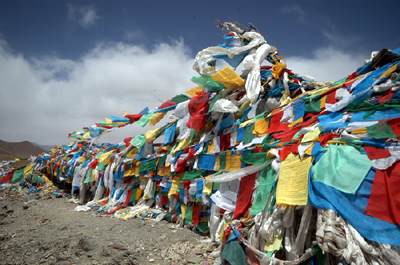
Prayer flags at a high pass on the road to Lhasa
From the Chengdu Gonzo Field Office
(continued)
By Freeman Anthony
The next day is a dusty one to Lhasa. Tashi Gompa takes us past Yamsto
Lake, the most holy lake in Tibet, which the Chinese are slowly draining
to make hydropower. At a high pass between the lake and the river valley
that will lead us to Lhasa, Tashi stops at a small Tibetian encampment
and purchases a roll of prayer flags. Tashi, Simon and I string these
over the road cut, along with countless others. These prayers will flutter
away into the Tibetan landscape for years in our absence. From here
we descend into the Kyichu River valley and on to the tourist mayhem
of Lhasa.
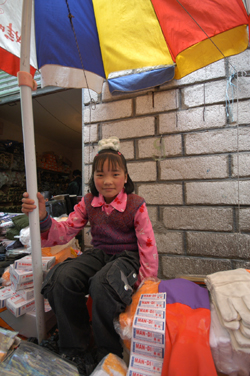
A young Han Chinese girl in Lhasa marketplace
I'm saddened to think of what Lhasa must once have been. We pack into
the hotel, say our goodbyes to our maniacal, yet fully likable drivers
and look for Internet, food and knick-knacks. First on the hit list
is the Potala palace, amongst throngs of Chinese tourists, with its
CCTV security, glassed in Buddhas, and uptight museum style intimacy.
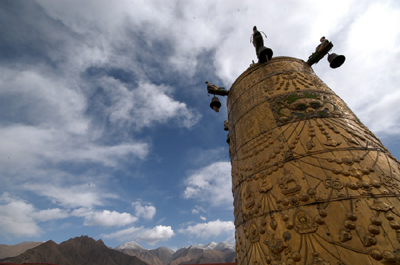
Gilded tower at the Jhokang in Lhasa
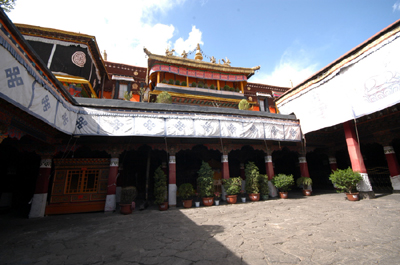
The interior courtyard of the Jhokang,
the spiritual centre of Tibetan Buddhism
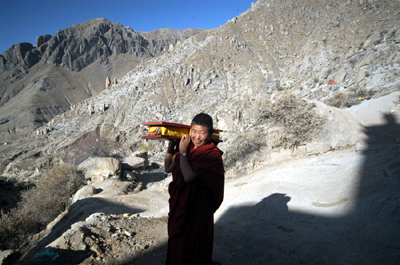
Monk carrying Buddhist scriptures outside
the Dearing Monastery near Lhasa
A few monasteries out of town provide glimpses into the daily monk
routine of crackling religious debates, food preparation over massive
earthen fireplaces, and chanting in the grand assembly hall. The sights
and sounds are fantastic and evoke all manner of awe and wonder in my
brain, even surrounded as I am by multicolored Gore-Tex and big black
cameras. I learn to appriciate the solitude of our journey here.
I had planned to do some trekking near Lhasa, but after more than a
week at high altitude, as I view factory painted Chinese signboards
over Tibetan artifact shops, I want out. I don't want to see any more
signs of the dilution of this truly unique culture.
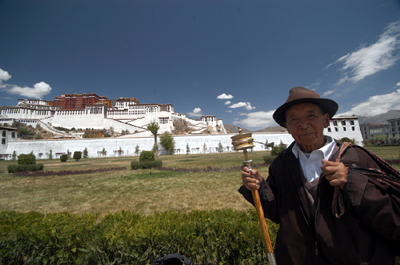
Pilgrim at the Potala Palace in Lhasa
On the third morning in Lhasa, all the team except myself are off to
Kathmandu via plane, so we get the final photo at 7 a.m. with Tesring,
exchange e-mails, and go our own ways. I stroll around for the morning,
happy to be free of a predetermined itinerary, and visit the bus station
to sort out my next move.
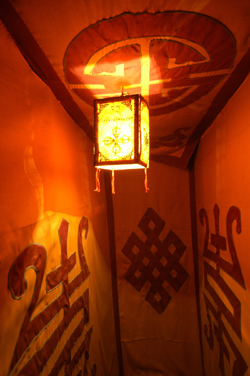
Stairway in a Lhasa restaurant
The next bus to Chendu leaves at 4 p.m., with none for three days afterwards.
That decides it. I'm off. I buy the ticket and stow my gear in the back
row. It's a sleeper, and by some miracle, I've been given the fourth
out of five seats along the back bottom level, so I'm in line with the
aisle and can stretch my legs out. I've got a rambunctious young monk
to my right and a hardened security guard on my left. No English here
at all. Tesring had suggested I go by air, but that doesn't work with
my overland trip concept. Thirty hours later and halfway there, I would
rethink this position.
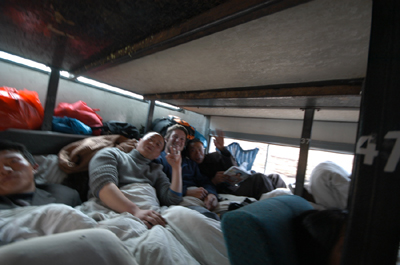
In the back of the bus with bunkmates
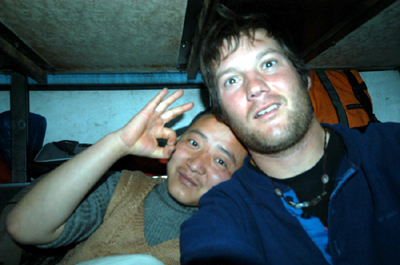
In the back of the bus with Xian Zhou, a young Buddhist
monk
from the Chengdu area returning from training in Lhasa
The first 20 hours are needed just to get off the plateau to Golmud
on a shattered roadway alongside large tankers and the occasional small
farm vehicle. All along the roadway, the recently completed Golmud/Lhasa
railroad is visable within a kilometer or two, yet still not an option
for passenger travel. Our bus trip includes three breakdowns and a two-hour
stop at a police checkpoint, where my papers get the least attention
of anyone. We stop every six hours or so for breaks and eat once a day
in grotty little mess halls with bleak cluttered courtyards, with no
signage to indicate that food, hygienic or otherwise, can be purchased
within. The gate is usually locked behind the bus, as well, to add to
the mystique.
The routine begins to center on getting the westerner
drunk and making me eat food that gets progressively more spicy as we
get closer to the Sichuan Province. Both rice wine and Piju (beer) are
forced upon me, the whole affair laced with cigarettes. I try to start
with my Chinese lessons, but they don't seem to clue into my repetition
as an attempt to say something correctly, finding it a source of great
humor instead.
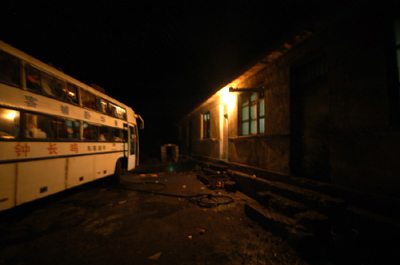
Outside an inconspicuous dining hall late at night
After the 60-ish hour ride, my ride became the Bus of Doom, my nemesis,
whenever I am forced back on the thing and must tuck myself into my
30-centimeter-wide berth.
We pull into Chengdu on a typically hazy morning, and I'm in a serene
state, knowing I'll soon be stationary. By 10 a.m. I'm at the Rongcheng
Hotel, savoring modern conveniences and trying to forget about my messed
up back muscles. Time to reclaim my "vacation" with ice cream,
a straight-razor shave, and a back rub.
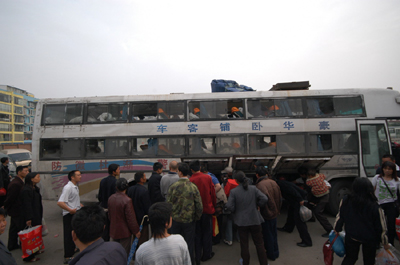
Disembarking from the Bus of Doom in Chengdu

|